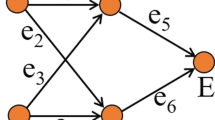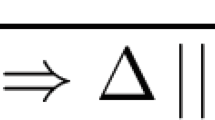Abstract
We present a new method for generating algebraic invariants of hybrid systems. The method reduces the invariant generation problem to a constraint solving problem using techniques from the theory of ideals over polynomial rings. Starting with a template invariant—a polynomial equality over the system variables with unknown coefficients—constraints are generated on the coefficients guaranteeing that the solutions are inductive invariants. To control the complexity of the constraint solving, several stronger conditions that imply inductiveness are proposed, thus allowing a trade-off between the complexity of the invariant generation process and the strength of the resulting invariants.
Similar content being viewed by others
References
Asarin E, Dang T, Maler O (2002) The d/dt tool for verification of hybrid systems. In: Proc 14th international conference on computer aided verification. LNCS, vol 2404. Springer, Berlin, pp 365–370
Baader F, Nipkow T (1998) Term rewriting and all that. Cambridge University Press, Cambridge
Bengtsson J, Larsen KG, Larsson F, Pettersson P, Yi W (1995) Uppaal—a tool suite for automatic verification of real-time systems. In: Proc of workshop on verification and control of hybrid systems III. Oct 1995. LNCS, vol 1066. Springer, Berlin, pp 232–243
Bensalem S, Bozga M, Fernandez J-C, Ghirvu L, Lakhnech Y (2000) A transformational approach for generating non-linear invariants. In: Static analysis symposium, June 2000. LNCS, vol 1824. Springer, Berlin
Bockmayr A, Weispfenning V (2001) Solving numerical constraints. In: Robinson A, Voronkov A (eds) Handbook of automated reasoning, vol I. Elsevier, Amsterdam, pp 751–842. Chapter 12
Collins GE, Hong H (1991) Partial cylindrical algebraic decomposition for quantifier elimination. J Symb Comput 12(3):299–328
Colón M (2004) Approximating the algebraic relational semantics of imperative programs. In: 11th static analysis symposium (SAS’2004). LNCS, vol 3148. Springer, Berlin
Colón M, Sankaranarayanan S, Sipma H (2003) Linear invariant generation using non-linear constraint solving. In: Somenzi F, Hunt W Jr (eds) Computer aided verification. LNCS, vol 2725. Springer, Berlin, pp 420–433
Cousot P, Cousot R (1977) Abstract interpretation: a unified lattice model for static analysis of programs by construction or approximation of fixpoints. In: ACM principles of programming languages, pp 238–252
Cousot P, Halbwachs N (1978) Automatic discovery of linear restraints among the variables of a program. In: ACM principles of programming languages, Jan 1978, pp 84–97
Cox D, Little J, O’Shea D (1991) Ideals, varieties and algorithms: an introduction to computational algebraic geometry and commutative algebra. Springer, Berlin
Forsman K (1991) Construction of Lyapunov functions using Gröbner bases. In: Proc 30th IEEE CDC
Garey M, Johnson D (1999) Computers and intractability: a guide to the theory of NP-completeness. Freeman, New York
Halbwachs N, Proy Y, Roumanoff P (1997) Verification of real-time systems using linear relation analysis. Formal Methods Syst Des 11(2):157–185
Henzinger TA (1996) The theory of hybrid automata. In: Logic in computer science, LICS 1996. IEEE Computer Society, Los Alamitos, pp 278–292
Henzinger T, Ho P-H (1995) Algorithmic analysis of nonlinear hybrid systems. In: Computer-aided verification. LNCS, vol 939. Springer, Berlin, pp 225–238
Henzinger TA, Ho P (1995) HyTech: the Cornell hybrid technology tool. In: Hybrid systems II. LNCS, vol 999. Springer, Berlin, pp 265–293
Karr M (1976) Affine relationships among variables of a program. Acta Inf 6:133–151
Lafferriere G, Pappas G, Yovine S (2001) Symbolic reachability computation for families of linear vector fields. J Symb Comput 32:231–253
Manna Z, Pnueli A (1995) Temporal verification of reactive systems: safety. Springer, New York
Mishra B, Yap C (1989) Notes on Gröbner bases. Inf Sci 48:219–252
Müller-Olm M, Seidl H (2002) Polynomial constants are decidable. In: Static analysis symposium (SAS 2002). LNCS, vol 2477. Springer, Berlin, pp 4–19
Murata T (1989) Petri nets: properties, analysis and applications. Proc IEEE 77(4):541–580
Parillo PA (2003) Semidefinite programming relaxation for semialgebraic problems. Math Program Ser B 96(2):293–320
Prajna S, Jadbabaie A (2004) Safety verification using barrier certificates. In: Hybrid systems: computation and control. LNCS, vol 2993. Springer, Berlin, pp 477–492
Rodriguez-Carbonell E, Kapur D (2004) An abstract interpretation approach for automatic generation of polynomial invariants. In: 11th static analysis symposium (SAS’2004). LNCS, vol 3148. Springer, Berlin
Rodriguez-Carbonell E, Kapur D (2004) Automatic generation of polynomial loop invariants: algebraic foundations. In: Proc international symp on symbolic and algebraic computation, ISSAC-2004, Spain
Sankaranarayanan S, Sipma HB, Manna Z (2003) Petri net analysis using invariant generation. In: Verification: theory and practice. LNCS, vol 2772. Springer, Berlin, pp 682–701
Sankaranarayanan S, Sipma H, Manna Z (2004) Non-linear loop invariant generation using Gröbner bases. In: ACM principles of programming languages (POPL). ACM, New York, pp 318–330
Sankaranarayanan S, Sipma HB, Manna Z (2004) Constraint-based linear relations analysis. In: 11th static analysis symposium (SAS’2004). LNCS, vol 3148. Springer, Berlin, pp 53–68
Silva B, Richeson K, Krogh B, Chutinan A (2000) Modeling and verifying hybrid dynamic systems using CheckMate. In: Proc conf on automation of mixed processes: hybrid dynamic systems, pp 323–328
Tiwari A (2003) Approximate reachability for linear systems. In: Hybrid systems: computation and control HSCC. LNCS, vol 2623. Springer, Berlin, pp 514–525
Tiwari A, Khanna G (2004) Non-linear systems: approximating reach sets. In: Hybrid systems: computation and control. LNCS, vol 2993. Springer, Berlin, pp 477–492
Tiwari A, Rueß H, Saïdi H, Shankar N (2001) A technique for invariant generation. In: TACAS 2001. LNCS, vol 2031. Springer, Berlin, pp 113–127
Windsteiger W, Buchberger B (1993) Gröbner: a library for computing Gröbner bases based on SACLIB. Tech rep, RISC-Linz
Yovine S (1997) Kronos: a verification tool for real-time systems. Springer International J Softw Tools Technol Transf 1, 1/2, October 1997
Author information
Authors and Affiliations
Corresponding author
Additional information
This research was supported in part by NSF grants CCR-01-21403, CCR-02-20134 and CCR-02-09237, by ARO grant DAAD19-01-1-0723, by ARPA/AF contracts F33615-00-C-1693 and F33615-99-C-3014, and by NAVY/ONR contract N00014-03-1-0939.
Rights and permissions
About this article
Cite this article
Sankaranarayanan, S., Sipma, H.B. & Manna, Z. Constructing invariants for hybrid systems. Form Methods Syst Des 32, 25–55 (2008). https://doi.org/10.1007/s10703-007-0046-1
Published:
Issue Date:
DOI: https://doi.org/10.1007/s10703-007-0046-1




